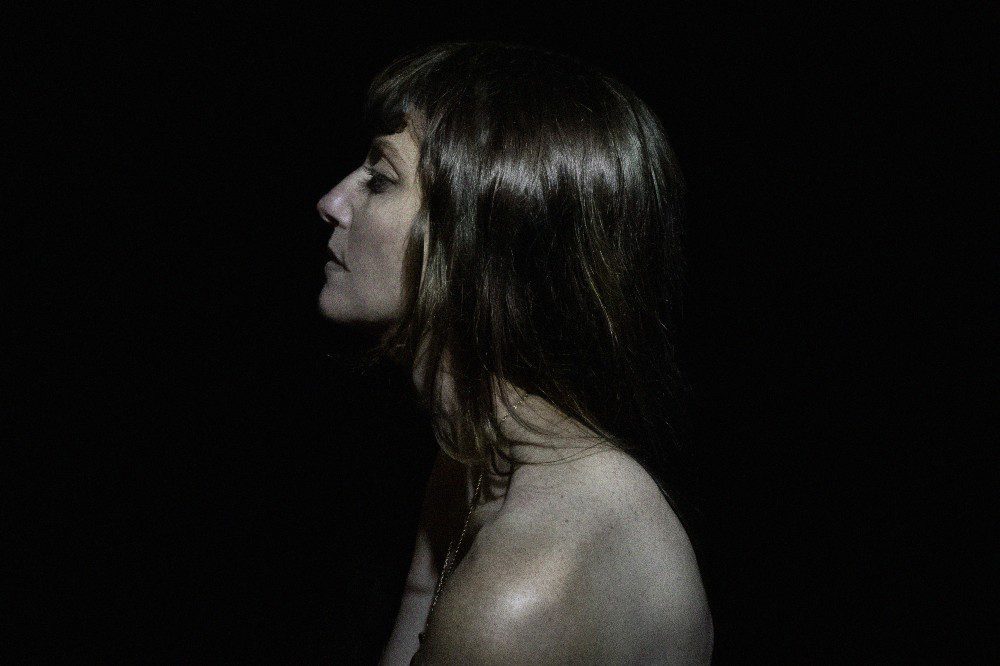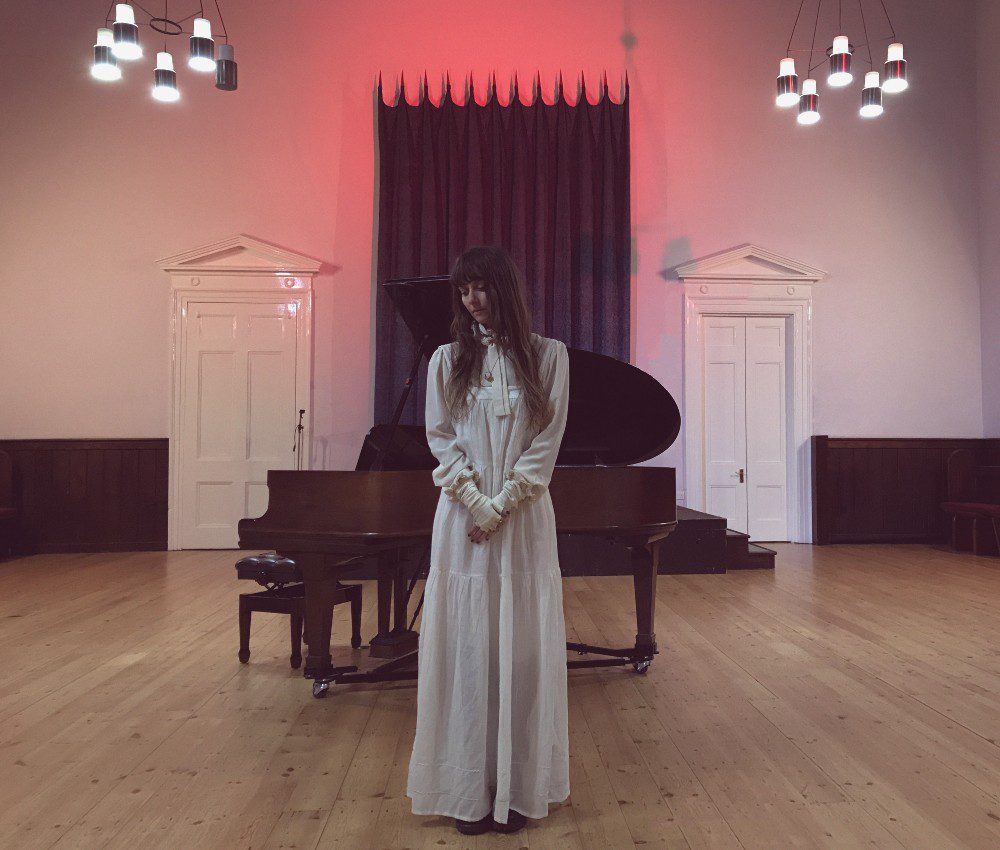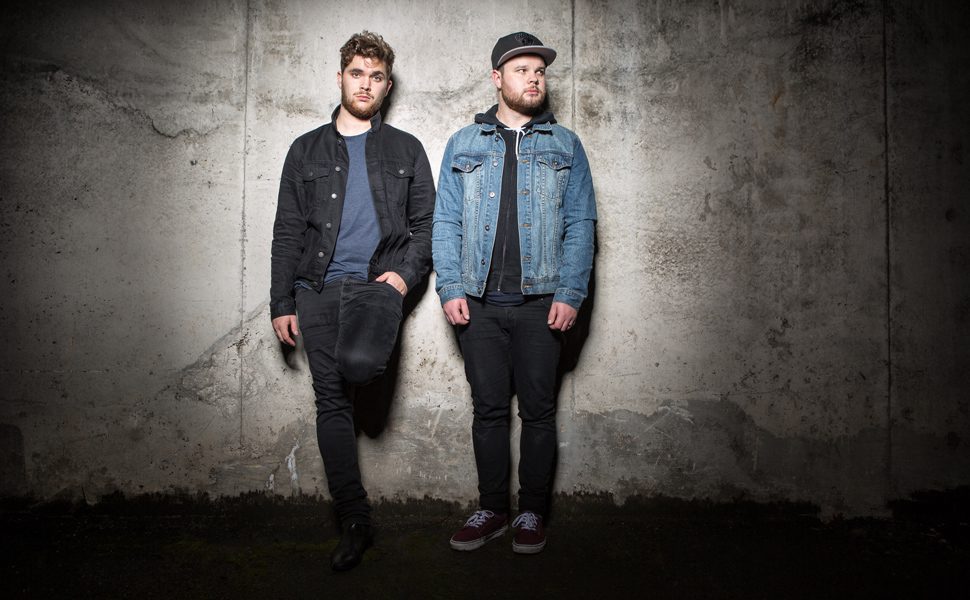

Penelope Trappes was sitting at her kitchen table when she realized that if she wanted to get her point across, she’d have to drag a dead body across a parking garage. She didn’t intend to commit an actual murder of course – just to use an anonymous woman’s corpse as a stand-in for the societal expectations, emotional labor, and even physical discomfort intrinsic to the experience of living in a female body. The sinister nature of her endeavor would evoke the work of dark auteurs like David Lynch and feminist art icons Cindy Sherman, Francesca Woodman, and Ana Mendieta, soundtracked with Trappes’ single “Blood Moon,” from the third installment of her solo LP series, Penelope Three, out May 28 via Houndstooth.
“Basically the whole album’s supposed to be a film, but due to time constraints that’s not gonna happen ‘til later in the year,” Trappes explains. She’s released equally haunting and gorgeous clips this album cycle, co-directed with Agnes Haus, for “Fur & Feather” and “Nervous,” the latter of which she says “was very much about channeling that sort of romantic gothic witchy stuff… borderline horror… tapping into some sort of subconscious response to what you’re hearing.”
Indeed, those aesthetics play out sonically across the album as Trappes delves into themes related to motherhood, aging, anxiety, grief and healing – the final chapter in a conversation she began in 2017 with her solo debut Penelope One and continued on 2018’s Penelope Two. Appropriately, Three feels like the most fully realized expression of Trappes’ vision, brought to life by atmospheric drones, ghostly vocal loops, mysterious samples, disjointed piano, guitar reverb, and evocative percussion.
“I believe in the power of three – life, birth and death… the holy trinity. There’s so many things that all revolve around the number three. When One came out it was very much about rebirth and birth and new life, and self empowerment. Two came about when a very dear friend of mine had passed away, and it brought up all these feelings of loss and grief. It doesn’t necessarily have to be an actual physical death – there’s all sorts of deaths that we have in our lives; la petite mort, all the way through,” Trappes says. “I found myself surrounded by a darkness in that sense, and the same happened with Three – there’s this struggle between the dark and the light that I’m interested in trying to sonically produce, to find that balance. So with Three comes the closing of the chapters – birth, death, and now life, which is, I believe, in order to live really happily, a constant state of working on healing.”
Trappes began her solo work in earnest after a decade as half of NYC-based electronic duo The Golden Filter, and says the shift in focus came from wanting to express her own personal story more fully. “I’d been very much part of a team. My partner and I, we’re a couple as well, we see eye to eye on everything and it’s wonderful. But it had got to a point of my maturity as a woman where I just wanted to be me, myself, and I, and explore things that were unique to my life to date,” she explains. “Very individual experiences, like being a single mum for a while there, and my childhood growing up in Australia, and traveling before I moved to America, all these things. I really wanted to make it very much as if it was, in essence, sort of a journal entry.”
Because most of her lyrics are more impressionistic than a typical diary, Trappes is able to extract what feels like ancient wisdom from every corner of her existence. From moving to a huge old house in Brighton after years of living in London, to the act of unpacking her anxiety, Trappes’ exploits take stirring, esoteric shapes. Opening with “Veil,” which she says was inspired by meeting a friend’s newborn baby, taking root with “Forest,” in which she visualizes all of humanity as a kind of inter-connected mycelium, and coming full circle with “Awkward Matriarch,” Trappes explores matrilineal bonds in atypical ways. This narrative was inspired by the eternal bonds shared with her daughter (who recently turned nineteen and left home) and her own mother, who has suffered with Parkinsons since Trappes was a teenager but is still “strong in spirit.”
“Motherhood was always going to be one of the main themes with my solo work,” Trappes says. “The music world’s changed so much in the last few years that it’s not a dirty word to say you’re a mother and active musician. It’s ridiculous, but when I first started out I didn’t tell a lot of people because I just didn’t want to hear the judgement, whatever way it comes, you know? There’s this self-empowerment, there’s these things that you struggle through, and the love – whether you ever have a child or not, we all have a mother, and whatever those connections are that people have with their mothers, they shape who you are and what you become or what you struggle with, what you need to heal from. That was really important to me, not just on a personal level about my own daughter and my mother, but on a sociological level.”
Throughout the album, Trappes’ intrepid production elevates these narratives to something intensely primal. “Awkward Matriarch,” for instance, starts off “deliberately super minimal and quiet,” but Trappes chose to build vocal layers over it to symbolize women across centuries and millennia singing together – “all the voices and all the struggle, and the joy in one song,” as she puts it.
“All the demos come from these drones, whether it’s with a synth or a guitar, like just reverb echoing. Meditation moments are sort of what creates the initial demos,” she adds. “And then, a track like ‘Nervous,’ for example, needed more. It needed to almost build that anxiety. At the end you’ve got this lift but there’s still the weight of it all.” Where the song goes, she says, mostly depends on its subject matter.
Though it was written before the pandemic, many will find resonance in the agoraphobic truths at the core of a song like “Nervous” as we begin to re-enter society. Trappes set out with the intention of making Penelope Three about healing, a concept that feels especially prescient now. “Self care has to come into play now, because everything is getting faster and weirder and systems are breaking down and the environment’s fucked,” Trappes points out. “It’s quite heartbreaking, but there’s also a lot of hope still. ‘Fur & Feather,’ for example, tries to address the polar opposites of my generation [and my daughter’s] generation and still trying to hold on to that hope and love.”
“Again, I believe in a very matriarchal sort of self-care and community care and those themes of caring; it doesn’t have to be a matriarchal or patriarchal thing, it’s just self-knowledge and self-care and self-love. Every song has an element of that,” she continues. “Songwriting, or writing of any form, for anyone, is very healing, just to get it out there. And for me particularly, that’s why being solo has been really good.”
Next up for Trappes is a UK tour, for which she’s hired pianist Hinako Omori and cellist Maddie Cutter (Trappes herself will focus on guitar and triggering samples and percussion at the shows). “It was really important to have women on stage with me for this story, this chapter,” she says. “The last album when I did some shows it was just me doing everything and it was kind of exhausting. I was always like a mad professor having to really focus and I couldn’t necessarily engage with the audience the way that I like to do.”

Now in her forties, Trappes refers to herself often as a “mature woman,” and admits that there’s a confrontational, almost punk attitude to the overarching narrative across her three records. She appears nude on the album covers, often twisting her body into alien shapes in defiance of conventional beauty standards, or letting a slow camera shutter distort her form. “As a parent, or as a performer, or I don’t know, any woman out there, is constantly under some sort of microscope as to how she should behave and what have you. So each song is addressing an element of that,” she says. “In every other creative arts industry, you get better with age; a novelist gets better, a film director gets better. Why should a musician be considered somewhat washed up after the age of 35, 30, 25? I find it really fascinating that being a mature artist in music is still frowned upon by certain parts of society.”
Trappes does recognize there’s been a shift in acceptance when it comes to aging and motherhood in the industry, only that it’s been a painstakingly slow one. “Look at Patti Smith and Laurie Anderson. They’re still going,” she says. “And I’m not stopping. It’s what you do, it’s what you love, it’s your life, and creation is life, so it just keeps going.”
Follow Penelope Trappes on Instagram and Twitter for ongoing updates.




